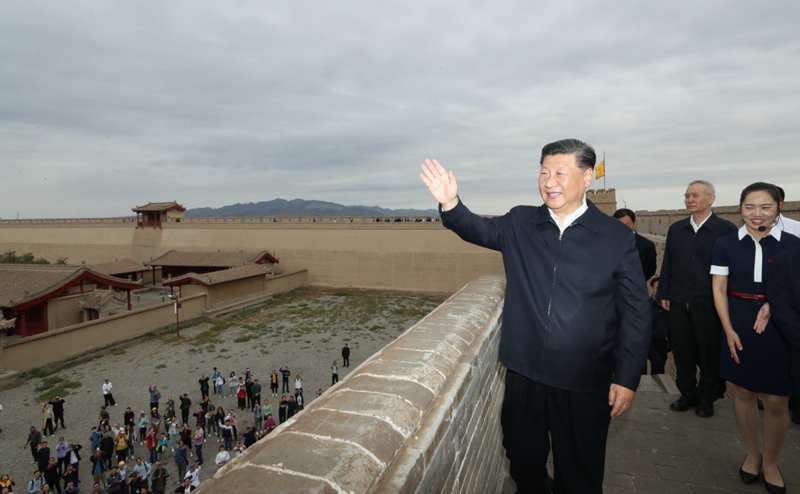
President Xi Jinping, also general secretary of the Communist Party of China Central Committee, visits Jiayu Pass, a frontier fortress at the west end of the Great Wall, on Tuesday during his inspection tour of Gansu province. [Photo/Xinhua]
Professionals encouraged to tell stories of Dunhuang, spread voice of China worldwide
President Xi Jinping underlined the need to preserve the finer features of the nation's culture, and called for extensive interactions between Chinese and foreign cultures as the country promotes inclusive international cooperation in the Belt and Road Initiative.
Xi, also general secretary of the Communist Party of China Central Committee, made the comment at a symposium attended by experts and scholars at the Dunhuang Academy in Dunhuang, home of the UNESCO World Heritage Site Mogao Grottoes, during his inspection tour in Gansu province on Monday.
Xi learned from a local official of the production and performance of major cultural shows like Silk Road, Flower Rain, the classical Chinese dance drama.
The president stressed the need to step up support in carrying forward and promoting China's traditional culture to preserve "our quintessence".
Saying that Dunhuang displays the Chinese nation's confidence in its culture, the president added that only a self-confident civilization can absorb and draw on the achievements of other civilizations in an inclusive manner while maintaining its own features.
As the nation strives to rejuvenate its culture, it needs to be more inclusive to extensively develop cultural exchanges with other countries and actively draw on the outstanding achievements of civilizations around the world, Xi said.
He encouraged cultural experts to tell the stories of Dunhuang and spread the voice of China to the rest of the world in an effort to promote international cooperation on the BRI.
Dunhuang, an oasis located at a religious and cultural crossroads on the Silk Road, boasts more than 2,000 sculptures and 45,000 square meters of murals in 735 cliff caves.
Before the symposium, Xi visited the grottoes and inspected the work of cultural relics protection and research. During his visit, Xi spoke with tourists.
Digging of the Mogao Grottoes began in 366. They symbolize the great achievements of China's Buddhist art from the fourth century to the 14th century. They also showcase the cultural integration and mutual learning among the diverse civilizations along the ancient Silk Road.
Fan Jinshi, an archaeologist who began working in Dunhuang in 1963 at the age of 25 and is now honorary president of the Dunhuang Academy, said she attended the symposium and was excited at Xi's placing so much importance on the protection of cultural relics, China Central Television reported.
Xi mentioned many times in his remarks the need to increase support for the protection of cultural relics, Fan said, adding that he also suggested employing high technology in protecting cultural relics.
In a written instruction to a national meeting on cultural relics protection in April 2016, Xi called cultural relics "a valuable legacy from our ancestors", and stressed that conservation will benefit future generations.
On Tuesday, Xi laid a floral basket at a monument in memory of the revolutionary martyrs of the West Route Army of the Chinese Workers' and Peasants' Red Army in Gaotai county, and paid tribute to those who sacrificed their lives in the battles against the Kuomintang from 1936 to 1937.
He also visited Jiayu Pass, the first frontier fortress at the west end of the Great Wall during the Ming Dynasty (1368-1644). He listened to an introduction of the Great Wall and the passes in Hexi Corridor, part of the ancient Silk Road.
|






7740f3b5-9ecb-438e-9052-76cb2d4bb671.jpg)

